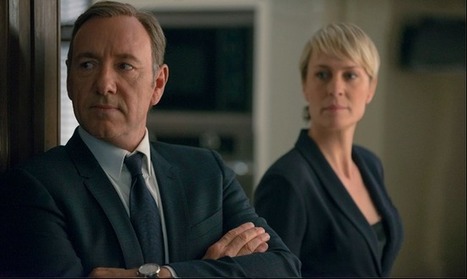What a difference a month makes. On February 23, Netflix and Comcast announced a deal under which the video streaming service and the cable company would "team up to provide customers (an) excellent user experience." Netflix said it worked "collaboratively" with Comcast and that the deal was "mutually beneficial." So [...]

|
Scooped by Martin (Marty) Smith |
This post is about a letter Netflix sent to the FCC looking for redress from their high infrastructure carrying costs. Streaming movies, something that is clearly the future of everything, isn't cheap.
Netflix requires an army's worth of bandwidth or their users see "buffering" instead of content. That Netflix's CEO's letter undercuts their recent Comcast deal seems like "inside baseball" politics.
That Comcast made $65B last year feels like we should be writing letters to the FCC. If 2008 was the Wall Street / banker financial crisis the next one of those isn't going to be about CASH.
No the next "financial" crisis will be about a cash proxy - access to bandwidth and the web. Are we creating another "too big to fail" situation with infrastructure companies like Comcast?
When everything is online from our money to our fridge aren't we the potential hostage? Occupy Wall Street feels moot and over. Occupy Time Warner and Comcast feels overdue.
Some call this new financial proxy battle Net Neutrality. Call it whatever you want, access is life, liberty and the pursuit of happiness. We can't let the few (infrastructure providers) reverse Moore's Law (cost of integrated circuits go down even as power increases) for the sake of bandwidth.
Netflix's CEO may be speaking for us all when he complains of being held hostage. Lets hope we keep a careful eye on our captors.



 Your new post is loading...
Your new post is loading...


![Curators Create Metadata For An Emerging Collective Intelligence [+Robin Good Note] | BI Revolution | Scoop.it](https://img.scoop.it/vzde2p5JYPsaZ2T72YNipDl72eJkfbmt4t8yenImKBVvK0kTmF0xjctABnaLJIm9)








Buy Adipex Phentermine online
Price: $150.0 – $430.0buy Alprazolam Powder
Buy ambien 10mg tablet
Buy basdène online without prescription
Price: $400.0 $200.0Buy basdène online without prescription
buy chewable viagra online
Price: $90.0 – $400.0Buy Clenbuterol Online
buy codeine phosphate
Price: $200.0 – $300.0Buy Demerol Online
Price: $150.0 – $400.0Buy Desoxyn 5mg Online
Price: $250.0 – $600.0Buy Dexedrine Online
Price: $180.0 – $600.0Buy Dihydrocodeine online
Price: $200.0 – $600.0Buy dilaudid online
Price: $150.0 – $420.0buy diuretics online
Buy Fentanyl Citrate Online
Price: $150.0 – $450.0Buy Fentanyl Patches Online